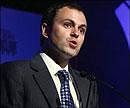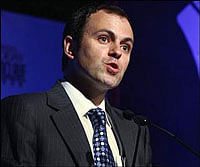

The 39-year-old Chief Minister, however, had a word of caution for moderate Hurriyat Chairman Mirwaiz Umer Farooq asking him to take his other members on board for talks as "otherwise all they will do is (to) jump on to the hard-line bandwagon and threaten the process."
"I think again (it is) realistic. You are not going to get a situation where New Delhi, Islamabad and the Hurriyat are going to be sitting at the same table -- it is not going to happen. Therefore, if you can work a system wherein you engage with Islamabad and you engage with New Delhi, both at the same time, I see no harm in it.
"We have done it from the mainstream point of view. I have had engagement with the government of Pakistan as well as the government of India, and I don't think anything harmful has come out of that," Omar told Karan Thapar in 'Devil's Advocate' programme of CNN-IBN.
Omar also chose to make it clear that his government would not only like to play the "role of facilitator" for Hurriyat Conference only but also for militant groups like Hizbul Mujahideen "as long as they give up the wrong side, the path of violence.
"Yes, I don't see any problem because we have done that not only in J&K, as I said, but also in the other states."
The Chief Minister said, "Well, if they are willing to, as I said, shift from a path of violence. Then sure I believe it would be possible for the state government to ask the government of India to engage them and if necessary for the state government to engage them as well -- let's understand that they are really not looking for anything from the state government. So our role is of a facilitator."
To a question about "secret talks" going on between the separatists and the Centre, Omar said there was no harm in having a dialogue away from the glare of media.
"I think quiet diplomacy is necessary for both sides to feel each other out, to see where the lines in the sand can be drawn, what they expect from each other and a certain amount of confidence building. Once that is done then the rest of the discussion will take place within the glare of all the publicity and attention that would follow. But I think for the time being a little bit of quiet won't hurt anybody," the Chief Minister said.
Referring to the stand of the Hurriyat for talks, he said "I think a lot of thought has gone into that line of thinking.
"I think it is the most realistic line we have heard from the Hurriyat in a very long time; and given the rather chequered history we have of having engagement with them I think this provides us a great opportunity for a graded sort of march towards the final solution we are looking for rather than a one-off agreement that everybody has to sign off on."
However, he said, the Mirwaiz is just one individual among a large number of leaders. No doubt he is perhaps the most high-profile among them and has a decent support base but he is "one individual" in the moderate Hurriyat faction.
There are others -- both at the top tier and the second level -- who also need to feel as part of the process. "Otherwise all they will do is to jump on to the hard-line bandwagon and threaten the process," he said.
On a suggestion by Hurriyat leader Abdul Gani Bhat asking National Conference, PDP and the separatists to join hands for solution to Kashmir issue, he said, "Well it is one thing to join hands; it is another thing to engage with. We have never had difficulties in engaging with the leadership of the Hurriyat Conference, whoever it may be.
"Joining hands has a completely different connotation. It means either they have to accept our line of thinking, or we have to accept theirs. It is a little premature in the process to (join hands)."
The Chief Minister was candid enough in saying about the role of hardline leader like Syed Ali Shah Geelani that he could not be included in the talks as the "goal post" set by him "would make a dialogue with him almost impossible".
"But then never say never again," he said.
Asked if Geelani has set a goal post that makes dialogue with him impossible and could the talks be meaningful, Omar said "sure, no solution is going to be acceptable to 100 per cent of the people. We should have the willingness to accept that.
"Therefore, there are going to be those people, who will not accept, whatever the outcome of this dialogue is. If Syed Ali Shah Geelani is going to be one of those people, so be it.
About whether the time had come for India to hold talks with Pakistan, Omar said, "...I believe it is important that we engage Pakistan. I think it definitely is in the interest of the both countries."
On Prime Minister Manmohan Singh's statement in Kashmir that there was no pre-condition to talks with Pakistan but it was essential that effective control be exercised over terrorist groups that target India, Omar said, "I think there is no doubt that it would definitely help Pakistan to exercise control over the forces that have in the past been used against India particularly in Jammu and Kashmir.
"So it's a win-win for both sides. Pakistan excising control over militants helps them domestically and it also ensures that India is able to get engaged with them in a sustained long-term dialogue and that, ultimately, is what both sides want," he said.